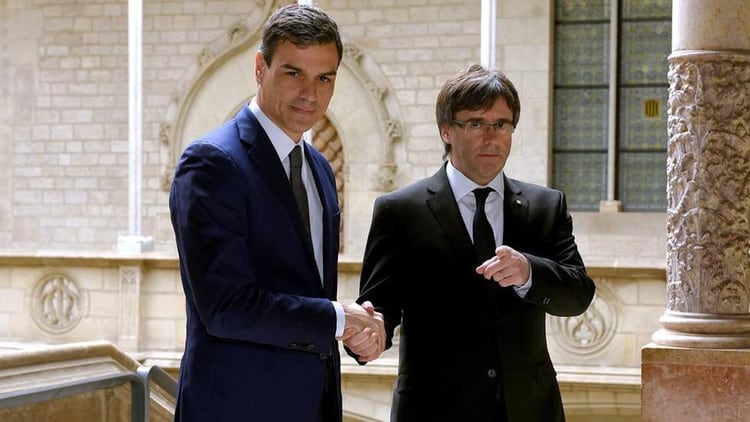Ángel Collado
Pedro Sánchez is already on track for his next investiture as president of the Government after gaining control of the governing body of Congress thanks to the support of his usual partners from the last legislature, the national and regional left-wing front, to which he now adds the Catalan coup plotters pending trial or on the run from justice, with the former president of the Generalitat Carles Puigdemont at the forefront.
The incumbent Prime Minister takes his continuity in office for granted, despite coming second in the elections and being forced to preside over a cabinet that is more in a minority, more radical on the left and more mortgaged to the separatist parties, now with advance payments, than the outgoing team.
Four weeks after the general elections, the leaders of Sánchez’s social-communist coalition are still euphoric because their setback at the polls was minimal (6 deputies) while the Popular Party is still in depression because its notable advance (from 89 to 137 deputies) is not enough to govern even with the rest of the right, including the regionalist parties. It can win 172 seats with Vox, Coalición Canaria and Unión del Pueblo Navarro, compared to the 178 seats Sanchismo is willing to hold.
The winner of the elections, Alberto Núñez Feijóo, has just four seats in a 350-member Chamber of Deputies, and has almost every chance of becoming head of the opposition against the runner-up, Pedro Sánchez, and is preparing to rebuild the same parliamentary majority that he used to come to power in 2018 through the motion of censure against Mariano Rajoy.
And just as then, without winning at the ballot box, a key to this is once again a fugitive from Spanish justice installed in Belgium so as not to account for his criminal responsibilities for the secessionist attempt of October 2017 in Catalonia. The deputies then under Puigdemont’s orders in Congress gave their “yes” to Sánchez together with all the left-wing, pro-independence and nationalist parties in Parliament.
The secretary general of the PSOE is returning to the origins and support of his rise to power to give continuity and normality to an unprecedented formula for staying in power in the 47 years of Spanish democracy: governing without winning elections.
Sánchez is reissuing his image these days with an image operation, repeated over and over again by the government media, according to which there is a “progressive” majority in Congress that won the elections against “the right-wingers”. In order to make his calculations work, just as they have already worked to gain control of the lower house’s Bureau, he includes in this bloc of parties such right-wing formations as the PNV, of declared traditionalist and confessional origin and a former ally of the PP’s executives, in the times of José María Aznar and later of Mariano Rajoy.
Moreover, as the acting head of the Executive also needs to add to this presumed parliamentary hegemony of the “forces of progress” the 7 MPs of Junts por Catalunya (Puigdemont’s party), the formation of the fugitive from justice is now whitewashed and considered to be akin to ERC or Bildu, the heirs of ETA’s political arm.
Puigdemont, of the Catalan supremacist right and linked to Putin to destabilise Spain and the EU according to the institution’s own reports, is courted for the “progressive” investiture of Sánchez in exchange for negotiating his judicial impunity and that of his supporters, plus a referendum for the secession of Catalonia.
The incumbent prime minister is in a hurry to ensure his continuity and shorten official procedures that allow his partners to raise and proclaim their bills on account of the Constitution and the unity of Spain. The PSOE and the president of Congress, Francina Armengol, are working to that end to the extent of declaring their leader as the “only possible candidate” in the week that the King, after consulting with party representatives between today and tomorrow, has to propose a candidate for investiture to the House.
Sánchez’s approach is so peculiar that he wants to be proposed first by don Felipe even if he came second in the elections and his allies, with whom he claims to have the “progressive” majority, have decided not to go to the King’s constitutional call to make it clear that they are against the Monarchy and the Constitution.
Puigdemont, on whom everything depends in the governability of Spain by decision of Sánchez himself, is willing to stretch as far as possible any procedure that makes clear the new stage of institutional crisis that is being installed in Spain. And the fugitive does not intend to confirm any support this week despite the fact that the acting Prime Minister will go to the interview with the King on Tuesday with the formula of the progressive majority around him to close the road to Feijóo.
Pedro Sánchez is already on track for his next investiture as President of the Government under the tutelage of the pro-independence groups.







